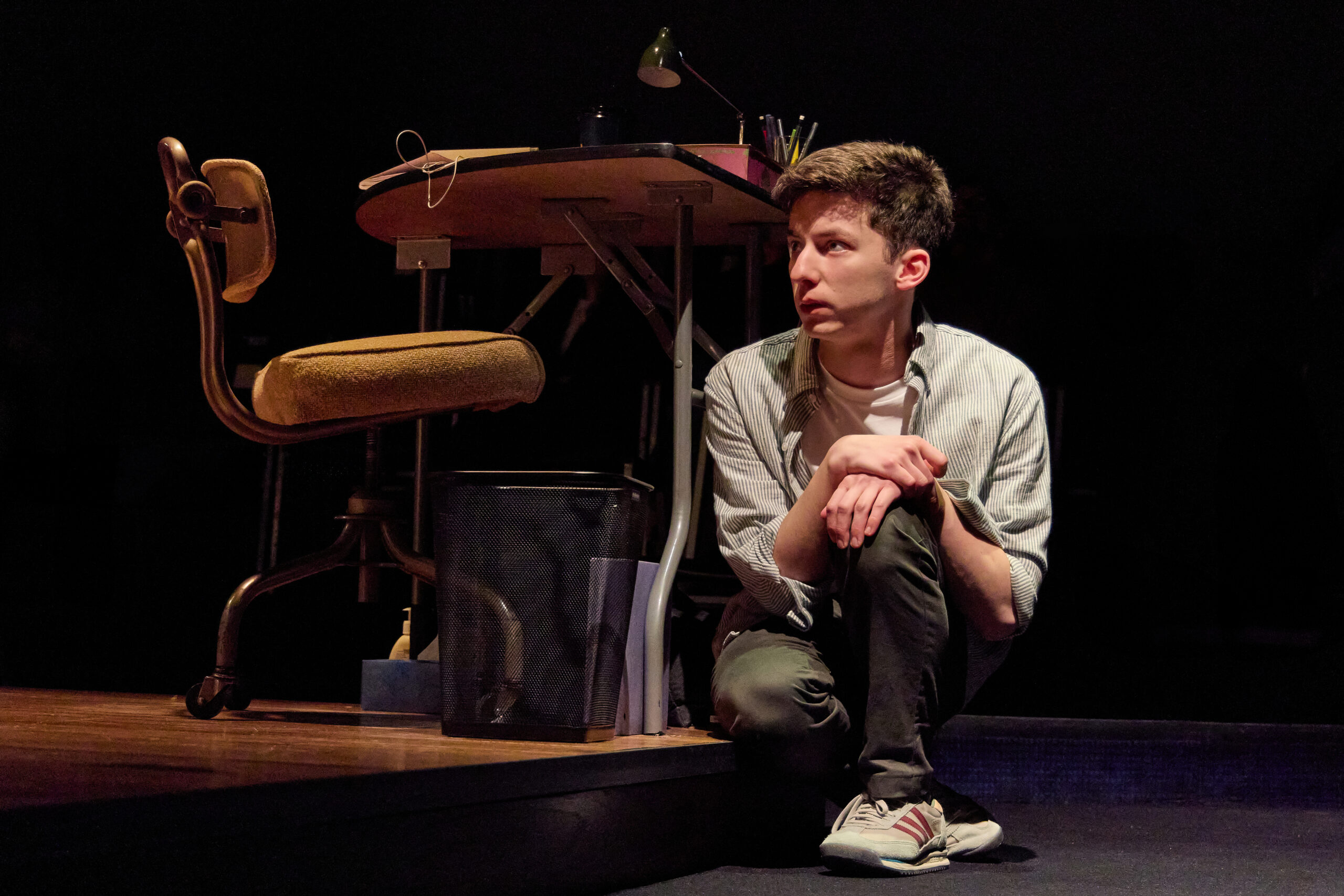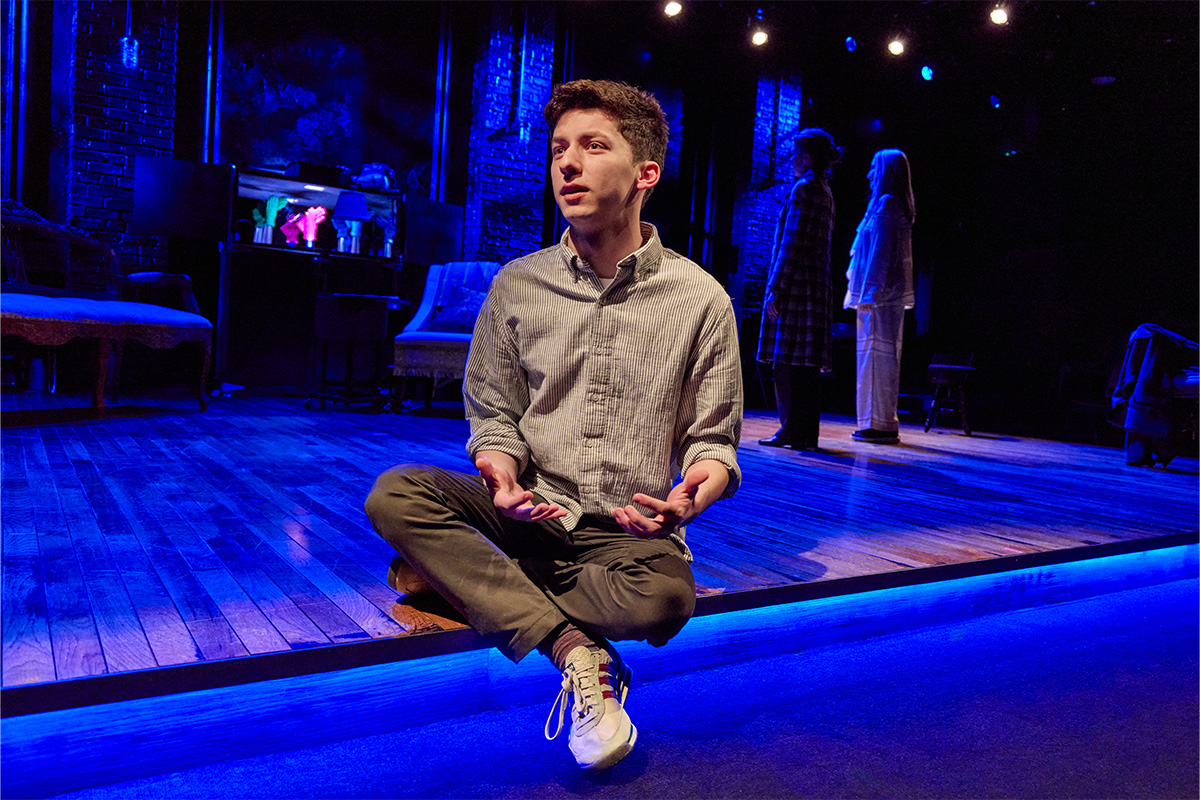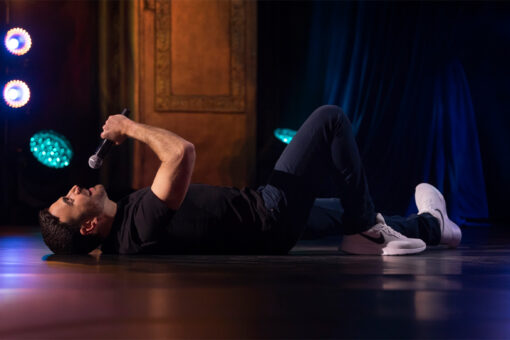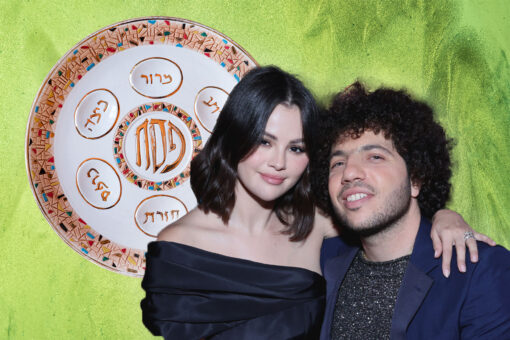“Um, so, I also wanted to ask about, like, your underwear…”
Andrew Barth Feldman and I are sitting outside the Maman near Columbus Circle. The sky is gray, threatening rain, while some sparrows nesting in the fire escape above our heads are threatening to shit on us. And I’m flopping a question about the Off-Broadway play he’s currently starring in, “We Had a World.” I continue stumbling closer to the inquiry I’ve written in the sage green notebook in front of me. “You start out the show in it.” I pause, taking a sip of mint tea.
“Yes I do,” the 22-year-old Jewish actor beams at me in a way that’s reassuring but not pitying. We’ve been sitting here for about 10 minutes and it’s obvious he really is just that kind.
“And you get undressed in front of the audience, as well,” I continue on, with another “Yes, I do” interjected from Feldman. “That’s pretty intimidating, no?”
I finally sort of get there. I’m not usually this nervous during interviews, though, in my defense, when’s the last time you asked a Broadway actor about their tighty-whities?
Feldman laughs and smiles again. “It’s pretty crazy. I’ve certainly never done anything like it,” he admits. He goes on to say that it’s an intentionally nightmarish and vulnerable move, not unlike a rebirth of sorts, that actually helps him glide into the world of the play. I relay that when I saw “We Had a World,” which is staged three-quarters in the round with no real backstage area, seeing him walk into the theater and mill about before taking off his clothes and stepping onto the only slightly elevated stage left me wondering if other audience members initially knew he was a part of the show.
He muses, “I’m still 16 to a lot of people, you know what I mean?”
I think I do.
Andrew Barth Feldman first gained notoriety in the theater world when he was cast in “Dear Evan Hansen” on Broadway, replacing actor Taylor Trensch in the lead role in 2019. He was a high schooler at Lawrence Woodmore Academy on Long Island at the time — less than a year earlier he caught the attention of “Evan Hansen” producer Stacey Mindich while performing at The 2018 National High School Musical Theatre Awards, known colloquially as The Jimmys. Feldman played Evan Hansen for a year, receiving praise from notoriously harsh New York Times theater critic Jesse Green as well as Times’ culture reporter Sarah Bahr. When he left the production, Feldman initially planned to attend Harvard University in the fall of 2020. But the COVID-19 pandemic put those plans on hold, and instead he continued to prove his place in the entertainment industry. (Feldman ultimately attended Harvard for a semester before taking a leave to focus on his career.)
He starred as Alfredo Linguini in a virtual benefit concert presentation of “Ratatouille: The Musical” and made his TV acting debut a little over a year later in “High School Musical: The Musical: The Series” as French exchange student Antoine. He turned to film soon after, snagging a featured role as a college-age vlogger named Alex in the Netflix film “A Tourist’s Guide to Love” and then starred in “No Hard Feelings” alongside Jennifer Lawrence as Percy, a socially-awkward virgin and incoming freshmen at Princeton.
But as Feldman has said, he’s not 16 any more. Which isn’t a knock on the awkward teen roles he plays so well. “We Had a World” is simply a new evolution in his career, one which requires an emotional depth, maturity and intimacy unlike anything Feldman’s ever done before.
If there were any question as to whether he’s is up for the task, the answer is a resounding yes.

“We Had a World,” from Jewish playwright Joshua Harmon, recounts Harmon’s relationship with his Nana Renee (Joanna Gleason) and his mother Ellen (Jeanine Serralles). The conceit is that Nana, who calls Josh (Feldman) in the opening moments of the play while, yes, he is in his underwear, asks him to write it “as bitter and vitriolic” as possible. And so Josh goes about the work of recreating this world, from his birth in 1988 to Nana’s death in 2018. He fills it with the pain of Nana’s alcoholism and her refusal to seek help.
From there, the rest of their problems take shape: Ellen is still reckoning with her abusive childhood and sometimes still abusive relationship with her mother — the climax of the play takes place at a disastrous Passover seder in 2018 which ends with Nana beating Ellen. She also has a deeply fraught relationship with her sister Susan. Meanwhile, Josh, who only learned of the alcoholism later in childhood, struggles to consolidate this ugly part of his Nana with the grandmother he loves. As this part of his world shifts, his anxiety flares, too, over his own sexuality and climate change.
But, the bad is irrevocably bound up with the good. For all the sadness and family drama in “We Had a World,” Harmon can’t not show the bright spots of his world with his Nana and mother. We bear witness to Nana introducing Josh to theater (a fateful move) and culture in New York City, taking him to see Diana Rigg in “Medea” on Broadway in 1992 and a Robert Mapplethorpe exhibition when he was 9. We feel the deep, protective bond Ellen and Josh forge because of Nana’s addiction. And the vibrant wit they all share with one another, making for some authentically funny moments amidst the melancholia, crackles tangibly.
It’s ultimately not surprising that Harmon, whose oeuvre includes plays “Bad Jews,” “Skintight” and “Prayer for the French Republic,” would write another play that is so damn beautiful. But “We Had a World”‘s searing and heartfelt examination of the tiny universes that our families build and that, inevitably, like a star, must die and become something new, is deeply felt. As Feldman points out during our conversation, part of the play’s triumph is its hyper-specificity to Harmon’s life that in turn, becomes universal to the audience. Case in point: By the end of the show, I was silently weeping hard enough about my own relationship with my mom and grandmother so as to elicit a “You good?” glance from my partner.
The other triumph is Feldman and his co-stars. Feldman speaks directly to the audience from the jump, developing a sincere rapport with which he guides the show with a deft hand. He invites the audience in, making us a part of the world, too — not so much spectators but fellow curators in the experience. From there, Feldman, Gleason and Serralles are scintillating together, espousing a chemistry that makes you question whether they’re actually related.
Back at Maman, Feldman tells me he came to this role via a reading with Harmon, director Trip Cullman and Joanna Gleason. It’s not unusual, he says, as a theater actor in New York City, to be a part of a reading like this. What is unusual, however, is that his agent, who he’s been with since he was 14 and who he “trusts with his life,” said he should do this one. He agreed, and now “We Had a World” is the first play he’s ever done in New York and the first theatrical role that he’s originated.
It’s also the first explicitly Jewish character he’s ever played. Sure, he’s played nebbish and Jewish-coded characters in the past: Evan Hansen, Seymour Krelborn in “Little Shop of Horrors” Off-Broadway and Percy Becker in “No Hard Feelings,” to name a few. But he’s never played a Jew where the character’s heritage presents itself in a meaningful way. For Feldman, the experience of playing a Jewish character is wonderful, particularly because he was drawn to the Jewishness of Josh in “We Had a World.”
Feldman explains that he grew up in an Orthodox Jewish neighborhood on Long Island, but his family wasn’t Orthodox. They were the “go to temple for Rosh Hashanah and Yom Kippur” family. It left him feeling less Jewish. Even so, he still feels deeply connected to the aesthetic of suburban New York Jewishness — getting hamantaschen and other baked goods at Walls’ Bakery on Long Island, doing an abbreviated Passover seder with the Hippity Hop Haggadah and finger puppets, having a bar mitzvah so he could throw an Andrew The Musical-themed party.
In case you’re curious, his bar mitzvah table centerpieces, featuring styrofoam photos of Andrew as different characters in musicals like “Aladdin” and “Grease,” now decorate the walls of the basement of his childhood home. “When people come for holidays or something, I’m like, ‘You’re about to see something really troubling. It’s a shrine to me,'” he jokes.
Now, Andrew lives on the Upper West Side and has for the past four years. He resonates with the “Zabar’s Jewishness” of “We Had a World,” a light yet innate touch of Judaism and Jewish culture. Similarly, he finds the way the play asks large questions about family and life but doesn’t provide any definitive answers to be very Jewish. “I think that that’s something that commercial theater has largely forgotten. People are coming and being like: This is what we’re trying to say,” he observes. “How about bringing us all in to the asking of the greater questions that can only be asked in art or can only be asked in a play? The kind of questions that we never explicitly get to ask in the play because they can’t be condensed. The whole play is asking these questions. Come join us in the asking. Maybe you’ll figure out the answer.”
Some of these larger questions that “We Had a World” poses also resonate with Feldman in a more tragic way. His mother Barbara passed away in August 2019, less than six weeks after being diagnosed with cancer. She was 54 years old and he was just 17 at the time. During our conversation, I ask if the weighty and familial nature of play makes him think about his mom. “Absolutely,” he says.
The specific circumstances of Harmon’s life, which are vastly different from his own, means that he can’t scan his experience into the play to attempt to draw emotion into his performance. It makes his job more difficult, but it’s also a gift, he says. It means he has to remain as present as possible with Gleason and Serralles as they conjure the ghosts of Harmon’s past for 100 minutes and investigate what is the best way to spend that time.
“Those are the moments where my mom feels the most present,” he says. “We had such a full life together and such a full relationship that there’s very little that I can wish for except that she were still around. So I think that emotionally, that well is there, and is so much of the reason why I can play this role at all. If that sort of tragedy had never happened to me, I don’t think you’d be sitting here talking to me about this play.”

“We Had a World” comes at a moment, too, when Feldman isn’t just expanding into more adult roles. His stardom is on the rise. This past fall he played Neil Levy in the highly publicized Jason Reitman SNL biographical dramedy “Saturday Night.” (Yes, Levy is Jewish in real life. No, his Jewishness doesn’t come up in the film.) In the movie, as in the real-life of 1975, Levy is Lorne Michaels’ cousin and de facto assistant. While Michaels wrestles with NBC execs to make the first episode of “Saturday Night Live” happen, an anxiety-riddled Levy handles production tasks big and small. Small as in getting a sandwich for Lorne. Big as in finding John Belushi, who has disappeared before going on air and hasn’t signed his contract yet, while accidentally high.
Feldman tells me he chatted with the real Levy before filming, which helped inspire his scene-stealing performance. “He said, ‘I knew that these people were my family, and it was the first place in my life I really felt like I belonged, and I couldn’t let them down.’ And that was everything I needed to play the role.”
I ask if he’s worried about getting typecast, pigeon-holed into more and more awkward, anxious, Jewish or Jewish-coded roles. He maintains that he’s not, nor would he take a role that doesn’t speak to him. “I think of myself more as a character actor than anything else,” he says. “I hope, going forward, I get to do even more in the sort of like Nathan Lane world of Jewish character actors. That is a lineage that I’m just obsessed with and feel connected to, and it’s happening [in “We Had a World”], too.” (Nathan Lane has previously called himself “an honorary Jew” for playing many Jewish roles throughout his career like Nathan Detroit in “Guys and Dolls” and Max Bialystock in “The Producers,” despite being Catholic.)
Feldman also recently voiced Dopey in the online discourse feedback loop that was the remake of Disney’s “Snow White,” starring Rachel Zegler and Gal Gadot. This late into the interview, I’m no longer nervous, but I still feel a bit sheepish asking: “Did any of the controversy affect you?”
“No!” He laughs. Apparently, Feldman was cast as Dopey relatively recently, around late 2024, and spent about four hours recording in a booth in New York City. No motion-capture. No shooting with Zegler or Gadot. No drama. In spite of all the discourse surrounding the film, it’s clear that Feldman is particularly proud of his role in the remake. He has always been public about his love for Disney, and tells me he is a huge fan of Zegler’s and that it means a lot to him to see people’s excitement about his role in the film. (Yes, he’s seen the viral TikTok.) “I’m honored to be Dopey,” he beams. “I was in a booth here in New York, and I teared up looking at this CGI friend and that’s a really cool moment in my career.”
Off-stage, he’s playing the supportive boyfriend to actress Helen J. Shen, who just made her Broadway debut as Claire in one of the most acclaimed new musicals of the season, “Maybe Happy Ending.” As he tells me how excited he is for her, especially as the Tony season approaches, and what a dream it is for them to both be doing shows they love, and on the same schedule no less, Shen serendipitously walks behind us and starts to enter Maman when she and Feldman notice each other. “Wait, I was just talking about you,” he smiles, then jokes, “Go away and come back when we’re done.”
I take it as my cue to wrap up. Besides, I think we’re starting to really test our luck with the birds.
So what’s next for Andrew Barth Feldman?
He hopes “We Had a World” continues to touch audiences in the way that it has. He tells me he can’t be concerned right now about whether to show would move to Broadway or elsewhere because he’s still so in the thick of it. But he’s still finding so much gratification and love from the experience of starting a conversation with the audience.
And in terms of his own projects, there’s still so much more we have to see from him. “I’m always in a corner brewing,” Feldman says. “No matter what else I’m doing, I have to be keeping that [creative impulse] alive for my own sanity, but also because I feel like I have a lot to give in the department of making weird shit.”
One example, maybe not of “weird shit,” but of what he has to offer is writing his own family stories: Feldman tells me he’s fascinated by shiva, and has been working over the years to write something about his mother’s shiva. It was actually a joyful experience for him, he says, but one where other members of his family cracked under the pressure of being supportive. He’s interested in exploring that dichotomy and the idea of trying support someone through grief when you yourself are grieving. For that kind of story, he acknowledges that Harmon has offered him a master-class.
But for now, Feldman is happy just seeing what comes his way. “Things keep just sort of cropping up for me in a really amazing way. I get to fulfill dreams I didn’t realize I had. This [play] is one. This is a huge one,” he says. “My career has happened in these leaps and bounds and continues to surprise me. So whatever’s next, I’m ready to be surprised.”
Maybe I’m a little biased — to chat with Feldman even just for part of a dreary spring afternoon is to become a fan — but I’m ready to be surprised along with him.



